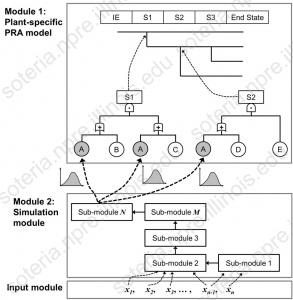
Importance Measure (IM) analysis is one of the key steps of Probabilistic Risk Assessment (PRA) and generates a ranking of risk contributing factors, such as basic events. The results of the IM analysis lead to a better accident prevention by identifying the risk-significant factors that need resource allocation. This research develops and applies an advanced IM method for the Integrated PRA (I-PRA) framework. The classical IM analysis methods, such as Fussell-Vesely IM and Risk Achievement Worth (RAW), are not sufficient for I-PRA because I-PRA has a few key differences from classical PRA with respect to the characteristics of input parameters and model structure: (i) input parameters of I-PRA are given in various units and wide ranges, unlike the basic event probabilities in classical PRA that have no units and only range from 0 to 1; and (ii) the simulation-based module in I-PRA sometimes consists of a non-closed form of equations and may involve nonlinearity and complex interactions among input parameters, as opposed to the classical PRA model that is a linear function of basic event probabilities. Because of these differences, classical IM may produce an incorrect ranking of risk-contributing factors if applied to the I-PRA framework at the subcomponent level; therefore, for I-PRA, the scope of IM analysis needs to be expanded.
For I-PRA, a moment-independent Global IM method is selected and applied. The selected Global IM is capable of explicitly capturing three key features of the I-PRA framework: (1) uncertainty of input parameters, (2) nonlinear interactions among input parameters inside the model, and (3) uncertainty associated with the model output. The ongoing research applies the selected Global IM method to the realistic I-PRA frameworks developed for Generic Safety Issue 191 (GSI-191) and Fire PRA.